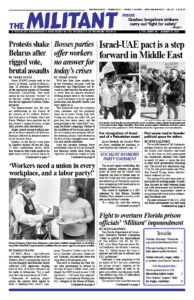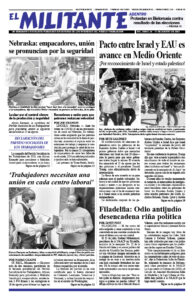September 4, 1995
The recent exposures about racist cop violence described by Los Angeles ex-policeman Mark Fuhrman on taped interviews highlights once again the nature of police in capitalist society. The tapes expose the corruption, frame-ups, and total disregard for the most elementary rights of human beings. For working people, experience with cops is no film script or Hollywood movie.
Whenever the rotten character of the police is exposed, the authorities are quick to point to “rogue” cops or “rotten apples” and act surprised. Blacks, Latinos, poor whites and poor Asians have known about this behavior for years.
The police department is an anti-working-class, racist institution. The brutality they inflict on working people is the same, whether in the Black community or on the picket line against workers striking the Detroit newspapers.
September 4, 1970
As antiwar forces around the country plan for a national day of protest Oct. 31, evidence points to the biggest participation of the labor movement so far. In Chicago, Patrick E. Gorman of the Amalgamated Meatcutters and Butcher Workmen of North America threw his weight behind the Oct. 31 coalition in that city. The national membership of the Meatcutters is a half million.
The national convention of the National Alliance of Postal and Federal Employees voted Aug. 21 to back the protest. A predominantly Black union, the alliance resolved: “That the NAPFE publicly endorse and support any legal and peaceful mass demonstrations against the immoral and illegal war. We encourage our membership to participate in order to bring to bear the power of our movement to end the war in Indochina and press for a reordering of priorities at home!”
September 1, 1945
CIO President Philip Murray on Aug. 22 warned that the American workers will not submit to starvation under capitalism and are demanding government ownership and operation of idle plants.
Murray himself was not proposing such a policy. He was merely using a threat to impress Congress with the need to “assure” full employment under “free enterprise.” Murray’s warning reflected the demands rising ever more insistently from the ranks of labor.
Murray should take the initiative in calling for a nation-wide conference of the entire labor movement to draft a legislative program embodying a genuine labor plan for full employment.
Murray’s duty is to mobilize the union ranks for an independent, militant struggle for such a program, the central plank of which must be government ownership and operation of the idle plants under workers’ control.

